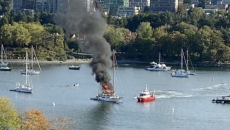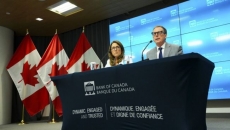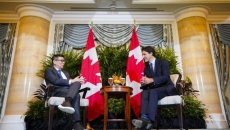Prime Minister Justin Trudeau will chat briefly Sunday with Indian Prime Minister Narendra Modi on the margins of the G20 summit, where he's expected to raise concerns about foreign meddling in Canada's politics.
The Canadian delegation sought a meeting with Modi during the annual meeting of the world's largest economies, but Sunday's 10-minute meeting wasn't confirmed until after Trudeau landed Friday in New Delhi.
India, now the world's most populous country, is featured prominently in the Indo-Pacific, a region Canada is seeking to expand its trade reach and reduce the influence of China.
But national security adviser Jody Thomas has also flagged India as a top source of foreign interference in Canada, particularly around support within Canada's Sikh community for separatist sentiment emanating from the Indian state of Punjab.
Trudeau vowed Friday that he would raise the issue of foreign interference if granted a face-to-face meeting with Modi.
"As always, we will emphasize how important the rule of law is," Trudeau told a news conference in Singapore before departing for New Delhi.
China is not the only country deserving of scrutiny when it comes to foreign interference, said Trudeau, whose Liberal government on Thursday announced a long-awaited public inquiry into alleged Chinese activity in Canada.
"It is incredibly important that we continue to protect Canadians from any and all types of interference," he said.
"One of the things we're focused on in this inquiry is recognizing, yes, China and Russia are responsible for interference, but other countries engage in it as well," adding that the commission "will go where the facts bring them."
While COVID-19 has featured prominently in discussions at the last several G20 meetings, it wasn't expected to dominate the talks again in New Delhi. But the Canadian delegation remains plagued by the virus, with four members of the travelling delegation on the Asian trip testing positive.
The officials were forced to remain behind following stops in Indonesia and Singapore. A spokesperson for the prime minister would not provide further comment to respect the privacy of the individuals. Trudeau has tested negative.
During the summit, the agenda will be focused on climate change, food security, global energy needs, gender equality and the Russian invasion in Ukraine.
New Delhi has previously argued that elements in Canada have been behind interference in domestic affairs in India, including in relation to the Khalistani separatist movement.
The Indian government sees it as an extremist movement that endangers national security, and has long accused Canada of harbouring extremists. Ottawa has maintained that freedom of speech means groups can voice political opinions so long as they are not violent.
Nadir Patel, Canada's former high commissioner to India, said the two countries have a resilient relationship, despite some challenges.
"This is a thriving relationship, and you can't say that about too many countries. India is among our fast growing trading partners, and the relationship is far more resilient than to be sidetracked by one or two issues," Patel said.
This is Trudeau's first trip to India since his controversial visit in 2018. At the time, Modi appeared to ignore Trudeau's presence entirely until the final days of the 10-day visit.
Patel said many of India's priorities at the G20 align with some of Canada's interests.
"The G20 will serve as an opportunity to make headway in those areas, but use those dialogues to bridge gaps that may exist elsewhere," Patel said.
"Not one issue will sidetrack the entire relationship."
The trip also comes as Canada has paused ongoing negotiations for a trade agreement with India.
Earlier this week, federal Trade Minister Mary Ng said the pause is only "a reflection to take stock of where we are."
On Friday, Trudeau said he had nothing to add.
``We know the negotiations around free trades are long and complex and I won't say anymore at this time."






